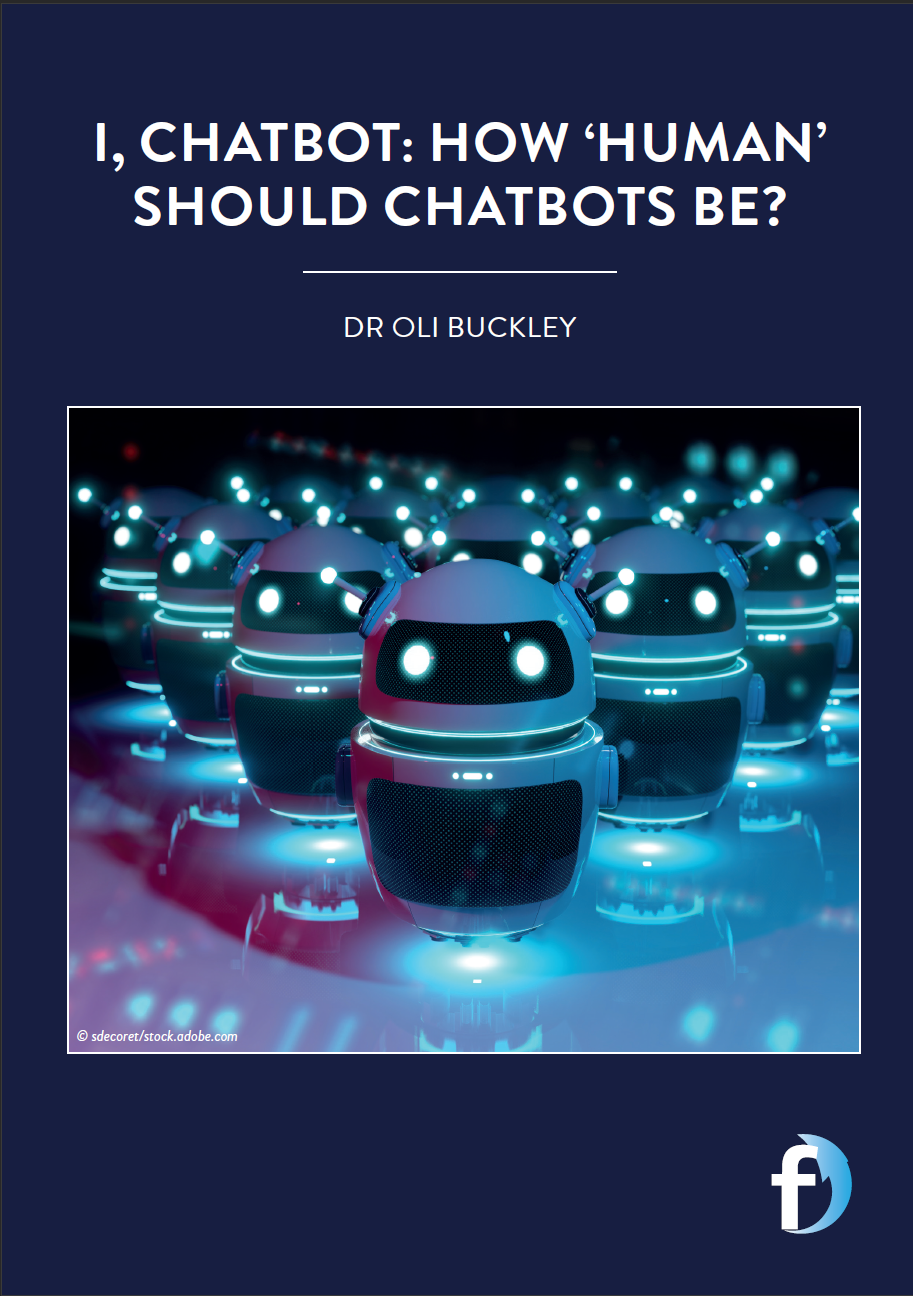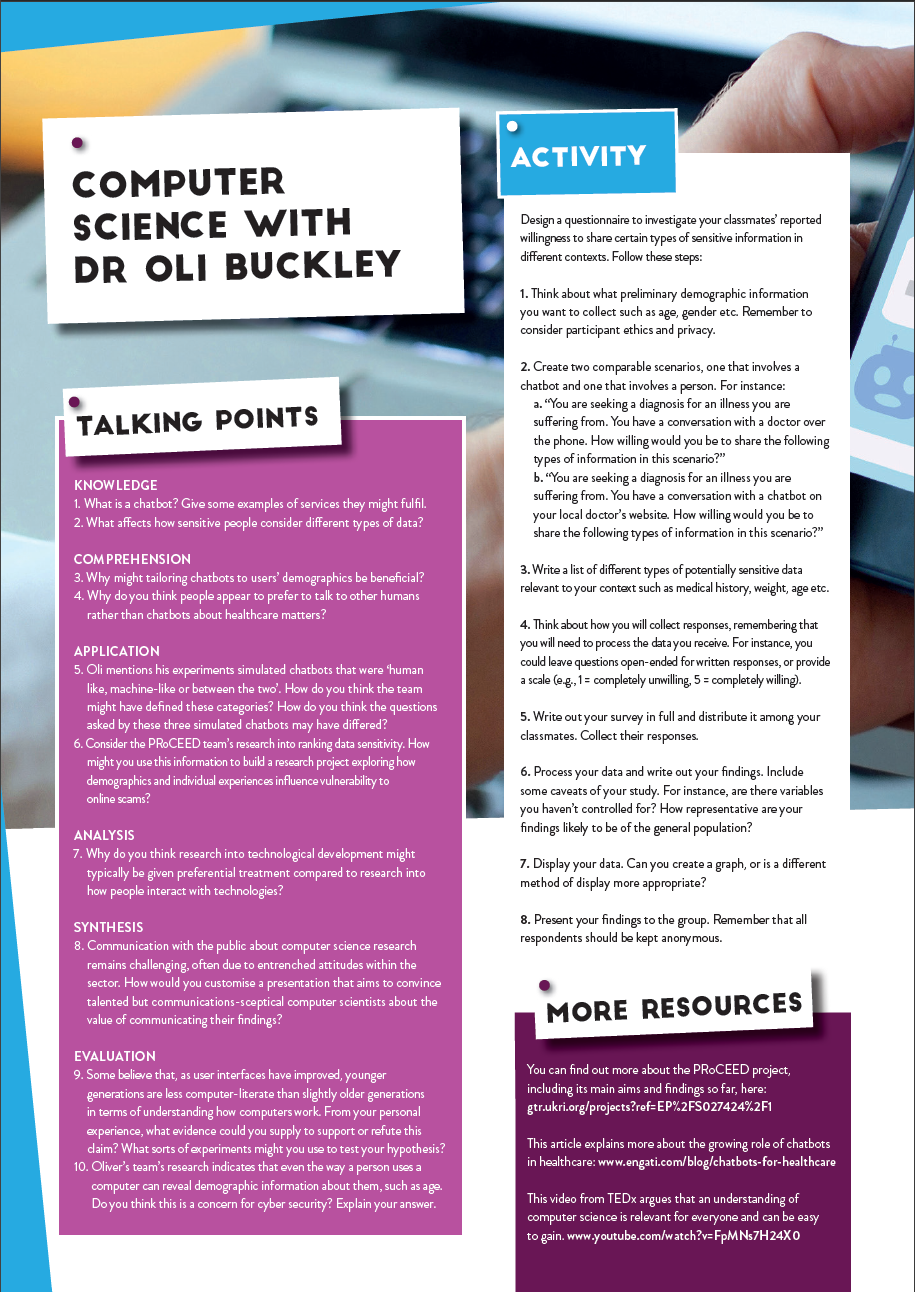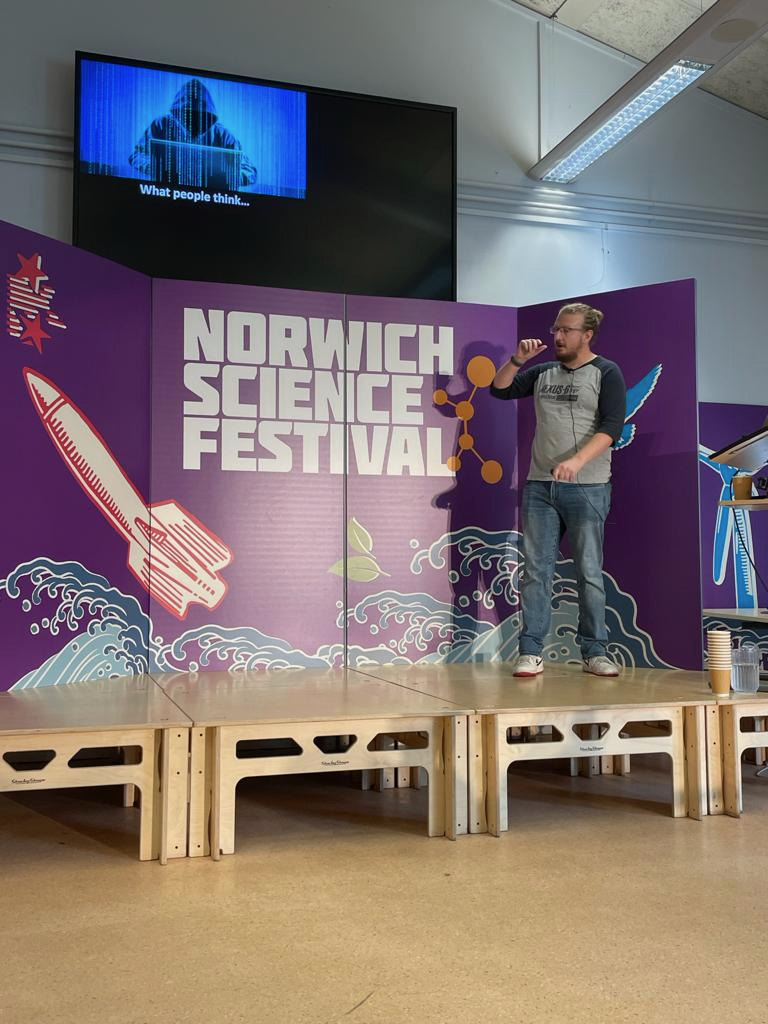I, chatbot: How ‘human’ should chatbots be?
Love them or hate them, chatbots are having an increasing role in the technological space, now that artificial intelligence has developed to a stage where they can be genuinely useful in fields such as healthcare, defence and finance. However, what users want out of a chatbot, and what information they are prepared to share, is less understood. At the University of East Anglia in the UK, Dr Oli Buckley’s research project is combining computer science and social science to answer these questions
TALK LIKE A COMPUTER SCIENTIST
ARTIFICIAL INTELLIGENCE – computer systems able to perform tasks normally requiring human intelligence
CHATBOT – a computer program that simulates conversations with human users
CYBER SECURITY – the application of technology to protect online spaces and data from cyberattacks
DEMOGRAPHIC – attributes of those within a population, such as age, ethnicity or height
PROTOTYPE – a preliminary version of a particular tool
WIZARD-OF-OZ EXPERIMENT – a particular form of an experiment in which participants believe they are communicating with a computer, but are interacting with a human
Services such as healthcare and finance are increasingly integrating intelligent technology, to take the pressure off people in the sector and to help ensure that users are given the best service possible. Dr Oli Buckley is leading a project called the Platform for Responsive Conversational Agents to Enhance Engagement and Disclosure (PRoCEED). This project aims to optimise chatbot technology for individuals and increase the trust needed for the conversations that ensue to help the user. Oli and his team are based at the University of East Anglia, while other project research partners are from the University of Cranfield, the University of Kent and Oxford Brookes University.
A ‘chatbot’ is any computer program that simulates a conversation with human users. They are typically used on a wide variety of websites to help guide users to the resources most relevant to them. “Chatbots can be found on pretty much every major website or service now,” says Oli. “What interests me personally is that it can be difficult to tell whether you’re talking to a real person or a computer, and I’m curious about how that uncertainty affects the way someone might communicate.”
This is often the case with technological advances: while capabilities increase dramatically, understanding the way that people make use of these capabilities tends to lag. “Although the technology is readily available for chatbots to fairly convincingly pass as humans during conversations with users, whether users want this is less understood,” says Oli. “Our work aims to help service providers understand how this technology can best be applied to ensure users feel most comfortable.”
TAILORING THE ONLINE WORLD
“As the world has become accustomed to working online and interacting with online services, we have become used to typing messages and chatting online,” says Oli. “Most people do this every day via messaging apps or texts, and so it is a familiar way of communicating.” Chatbots utilise this method, asking specific questions of users and responding accordingly to their answers.
“Chatbots can be customised based on user preference, and this is the heart of our research,” says Oli. “We want to understand whether different groups of people feel more comfortable with different types of bots. For example, do some people want to feel like they’re talking to a human or do some prefer talking to something obviously robotic?”
Answering these questions is very important for sectors such as healthcare, where making sure people feel comfortable enough to be honest and share potentially sensitive information is vital to ensuring they get the care they need. “The pandemic emphasised the need for this technology, as activities increasingly moved online and as healthcare services became increasingly under pressure,” says Oli. “Chatbots can enable large numbers of users to be assessed to discern who is in the greatest need.”
THE PROCEED PROJECT
“We used lots of different methods for this project,” says Oli. “One of the most significant was a ‘Wizard-of-Oz’ experiment, in which participants believe they are talking to a chatbot but are actually conversing with a researcher.” The team used this technique to ensure they could give consistent responses to users’ questions, while users’ answers reflected the ways they would converse with real chatbots.
This inclusion of human participants was essential for determining optimal human-chatbot interactions. “Humans are fascinating and always seem to respond differently to how you might expect,” says Oli. “Understanding what works for people and what doesn’t was a big challenge for our research, but an enjoyable one to tackle.” In addition to experiments, the team studied existing academic literature on the subject, to make sure their work built on what had already been done.
SENSITIVE INFORMATION
Oli’s team wanted to understand how comfortable people were with sharing different types of sensitive information with a computer. “We found that several factors impacted how people disclosed information,” says Oli. “These factors included risk of harm, trust in the method of interaction, public availability of the data, context of the data and risk of re-identification.” People also indicated concerns about sharing data related to personal safety, mental health or consequences for loved ones.
Reference
https://doi.org/10.33424/FUTURUM286
According to Oli’s research, although people prefer to talk to other humans about health matters, they leaned more toward chatbots for financial matters, such as sharing credit scores or income levels. © WavebreakMediaMicro/stock.adobe.com
Oli giving a presentation about chatbots at the Norwich Science Festival.
The way you interact with your computer, such as how you type or use a computer mouse, was often linked to individual traits such as your age and gender. © terovesalainen/stock.adobe.com
As more organisations moved online because of the pandemic, the need and use of chatbots increased. © New Africa/stock.adobe.com
“We ranked data in terms of sensitivity based on user responses,” says Oli. “We found that passwords were considered the most sensitive, followed by bank account details and other financial data. The least sensitive included things that are usually observable, such as height, weight, gender and hair colour.” Context and individual experiences also had an important role to play in the willingness to share certain types of information. Understanding these perceived sensitivities is useful for understanding what types of chatbots might be most appropriate in different scenarios.
CHATBOTS OR HUMANS
The team found that context was very important in terms of people’s preferences regarding talking with chatbots or humans. “People generally preferred to talk to other humans, particularly about health matters,” explains Oli. “This preference was less pronounced for financial matters, such as sharing credit scores or income levels.”
Preferences also depended on the demographics of the people involved. “We used the Wizard-of-Oz approach to gauge how much a person’s characteristics affected how they engaged with different sorts of chatbots – human-like, machine-like or between the two,” says Oli. These results are still being evaluated but have the potential to help tailor chatbots to people’s needs.
The team found that the way users interacted with computers, such as how they typed or used a computer mouse, was often linked to individual traits such as age and gender. “Computers can use these clues to guess an operator’s demographic so that the chatbot best suited to them can be automatically selected and used,” says Oli.
NEXT STEPS
Currently, the team is aiming to develop a prototype system of the technologies they investigated, which will deploy the appropriate chatbot for a user based on their probable preferences, which can be inferred from the way they use a computer. “We are also developing a tabletop game based around information sharing with machines,” says Oli. “This should help people understand the benefits and risks associated with sharing information with a chatbot, or any machine.”
The team’s findings are also directly informing new research projects. “I’m currently using our findings to see how chatbots can be used in mental health settings,” reveals Oli. “I’ve also recently started a project exploring the use of chatbots to encourage healthcare patients to log symptoms and daily updates to give a more rounded overview of their condition.” Healthcare, in particular, will benefit a lot from more customised chatbots, which have the potential to address several of the challenges encountered by health services around the world.

DR OLI BUCKLEY
Associate Professor
Cyber Security School of Computing Sciences
University of East Anglia, UK
FIELDS OF RESEARCH
Computer Science and Cyber Security
RESEARCH PROJECT
Investigate how chatbot technology can be optimised to provide a more effective method of communication, especially regarding building trust with the user
FUNDER
Engineering and Physical Sciences Research Council (EPSRC)
ABOUT COMPUTER SCIENCE
Computers are everywhere in the modern world and will become even more integrated into our lives in the future. Computer science as a discipline is becoming increasingly broad, ranging from ‘traditional’ computer science careers that focus on programming and coding, to social research into how computers can help solve societal problems. Oli explains more about his career and how the field is set to change in the future.
I like the varied challenges of cyber security research, particularly investigating how people interact with technology. At this point in my career, I rarely write code. I think working across different disciplines and constantly learning about new ideas is fantastic, as is being able to work with people. The people who take the time to program and write the codes are far more interesting than the software itself!
Being able to communicate your ideas and work to a non-technical audience is just as valuable as writing code – if not more so. Computer science is so much more than just coding. There are a whole host of areas you can work in, even if you don’t want to write code for the rest of your life.
Technology is now reaching a point where it can realistically do the things I considered futuristic sci-fi material when I was younger. This means that the way people use technology is becoming even more interesting. The human aspect plays an important role in things, and we need to explore this.
As artificial intelligence continues to develop, we’ll increasingly see the technology in even more places. Understanding how it fits alongside ethical and social implications is very important. For example, a computer may ‘intelligently’ rank people on a hospital waiting list, but is it ethically logical and reasonable? Does it consider unmeasurable emotional aspects, for instance?
Technology is now so readily available, with most of us carrying immensely powerful computers in our pockets. This means that more people have access to the internet, social media and online games, all of which involve sharing data. This poses important questions around security, privacy and trust, as well as the psychological and developmental implications of lives spent online. It will be interesting to see how future ‘internet-native’ generations evolve with technology and what challenges arise for computer scientists.
EXPLORE CAREERS IN COMPUTER SCIENCE
• Oli recommends sites such as Code Academy as an introduction to learning to code, which is an important skill for most computer science careers.
• The University of East Anglia’s School of Computing Sciences, where Oli works, has regular events with local schools as well as online outreach events. They often have a strong presence at the Norwich Science Festival and offer work experience and internship opportunities.
• Computer scientists are in high demand. According to Check-a-Salary, the average annual salary for computer scientists in England is £42,000.
PATHWAY FROM SCHOOL TO COMPUTER SCIENCE
Although mathematics and computing ability are essential, Oli believes that a wide range of skills is important for a modern-day career in computer science. He recommends subjects such as psychology to understand how people use technology, as well as communication skills. “Being able to write coherently about a subject is a hugely underrated skill in computer science at present,” he says.
HOW DID OLI BECOME A COMPUTER SCIENTIST?
WHAT WERE YOUR INTERESTS GROWING UP?
When I was younger, I wanted to be an artist because I loved drawing and creating things. I later aspired to become a doctor, until I realised that I couldn’t stand the sight of blood. I was always interested in computers and technology, but never really considered it as a career until much later.
WHAT ATTRIBUTES HAVE HELPED MAKE YOU SUCCESSFUL?
Although I have worked as a software engineer and did a reasonable job, I’m not the greatest programmer and didn’t have the patience to spend hours debugging code. I think my biggest strength is that I’m comfortable talking to people and enjoy explaining my ideas in an accessible way. I break the stereotype of the unsociable, disengaged computer scientist, as I love presenting my work and talking about my ideas. Users are fascinating, not an inconvenience, as some programmers believe.
HOW DO YOU OVERCOME OBSTACLES IN YOUR WORK?
I’m a firm believer in mindfulness. There is a lot going on in modern life and it is easy to become overwhelmed. Taking a moment to be in the present is massively useful when it comes to reframing a problem. Some of my solutions come to me when I’m not thinking about the problem.
HOW DO YOU SWITCH OFF FROM WORK?
I like to run regularly, accompanied by an audiobook. I don’t have a competitive streak; I just use it as an escape and like the peacefulness. I also love to play computer games, although being a father of four means there is little time to do this! I’ve slowly expanded that passion to include board games so that we can all sit and play as a family.
WHAT ARE YOUR PROUDEST CAREER ACHIEVEMENTS SO FAR?
After my PhD, I was quite disillusioned with scientific research. After a break, I came back to it and found a different field that I actually enjoyed. I’ve since built a Master of Science course for Cyber Security and won over £2 million in research grants. I feel very lucky to be doing something that I enjoy, and where I am contributing to the wider world.
OLI’S TOP TIPS
Be curious and take the initiative. There are thousands of resources to help you learn the technical skills needed for computer science. For instance, you can create simple games using Scratch or build your own websites using any of several different platforms.
Do you have a question for Oli?
Write it in the comments box below and Oli will get back to you. (Remember, researchers are very busy people, so you may have to wait a few days.)






